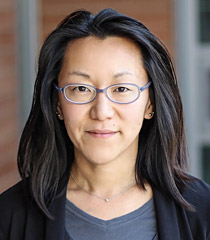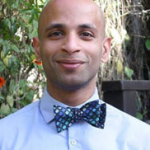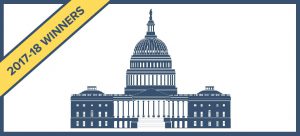Privacy Papers 2017: Spotlight on the Winning Authors
Today, FPF announced the winners of the 8th Annual Privacy Papers for Policymakers (PPPM) Award. This Award recognizes leading privacy scholarship that is relevant to policymakers in the United States Congress, at U.S. federal agencies, and for data protection authorities abroad.
From many nominated privacy-related papers published in the last year, six were selected by Finalist Judges, after having been first evaluated highly by a diverse team of academics, advocates, and industry privacy professionals from FPF’s Advisory Board. Finalist Judges and Reviewers agreed that these papers demonstrate a thoughtful analysis of emerging issues and propose new means of analysis that can lead to real-world policy impact, making them “must-read” privacy scholarship for policymakers.
The winners of the 2017 PPPM Award are:
Artificial Intelligence Policy: A Primer and Roadmap
by Ryan Calo, Associate Professor of Law, University of Washi ngton
ngton
Ryan Calo is the Lane Powell and D. Wayne Gittinger Associate Professor at the University of Washington School of Law. He is a faculty co-director (with Batya Friedman and Tadayoshi Kohno) of the University of Washington Tech Policy Lab, a unique, interdisciplinary research unit that spans the School of Law, Information School, and Paul G. Allen School of Computer Science and Engineering. Professor Calo’s research on law and emerging technology appears in leading law reviews (California Law Review, University of Chicago Law Review, and Columbia Law Review) and technical publications (MIT Press, Nature, Artificial Intelligence) and is frequently referenced by the mainstream media (NPR, New York Times, Wall Street Journal). Professor Calo serves as an advisor to many organizations, including the AI Now Institute, and is a member of the R Street Institute’s board.
The Public Information Fallacy
by Woodrow Hartzog, Professor of Law and Computer Science, Northeastern University
by Elizabeth E. Joh, Professor of Law, UC Davis School of Law
 Elizabeth E. Joh is a Professor of Law at the University of California, Davis School of Law, and is the recipient of the 2017 Distinguished Teaching Award. Professor Joh has written widely about policing, technology, and surveillance. Her scholarship has appeared in the Stanford Law Review, the California Law Review, the Northwestern University Law Review, the Harvard Law Review Forum, and the University of Pennsylvania Law Review Online. She has also provided commentary for the Los Angeles Times, Slate, and the New York Times.
Elizabeth E. Joh is a Professor of Law at the University of California, Davis School of Law, and is the recipient of the 2017 Distinguished Teaching Award. Professor Joh has written widely about policing, technology, and surveillance. Her scholarship has appeared in the Stanford Law Review, the California Law Review, the Northwestern University Law Review, the Harvard Law Review Forum, and the University of Pennsylvania Law Review Online. She has also provided commentary for the Los Angeles Times, Slate, and the New York Times.
by Craig Konnoth, Associate Professor of Law, Colorado Law, University of Colorado, Boulder
 Craig Konnoth Professor Konnoth’s work lies at the intersection of health law and policy, bioethics, civil rights, and technology. His papers consider how health privacy burdens are created and distributed, how medical discourse is used both to enable and harm civil rights and autonomy, and how technology can be used to improve health outcomes. He has examined these issues in in contexts as diverse as religion and biblical counseling, consumer rights and transparency, FDA regulation, and collection of individual data. His publications have appeared in the Yale Law Journal, the Hastings Law Journal, the Penn Law Review, the Iowa Law Review, the online companions to the Penn Law Review & the Washington & Lee Law Review, and as chapters in edited volumes.Before arriving at the University of Colorado, Craig was a Sharswood and Rudin Fellow at Penn Law School and NYU Medical School, where he taught health information law, health law, and LGBT health law and bioethics.
Craig Konnoth Professor Konnoth’s work lies at the intersection of health law and policy, bioethics, civil rights, and technology. His papers consider how health privacy burdens are created and distributed, how medical discourse is used both to enable and harm civil rights and autonomy, and how technology can be used to improve health outcomes. He has examined these issues in in contexts as diverse as religion and biblical counseling, consumer rights and transparency, FDA regulation, and collection of individual data. His publications have appeared in the Yale Law Journal, the Hastings Law Journal, the Penn Law Review, the Iowa Law Review, the online companions to the Penn Law Review & the Washington & Lee Law Review, and as chapters in edited volumes.Before arriving at the University of Colorado, Craig was a Sharswood and Rudin Fellow at Penn Law School and NYU Medical School, where he taught health information law, health law, and LGBT health law and bioethics.Designing Against Discrimination in Online Markets
by Karen Levy, Assistant Professor, Department of Information Science at Cornell University; and Solon Barocas, Assistant Professor in the Department of Information Science at Cornell University
 Karen Levy Karen Levy is an assistant professor in the Department of Information Science at Cornell University and associated faculty at Cornell Law School. She researches how law and technology interact to regulate social life, with particular focus on social and organizational aspects of surveillance. Dr. Levy’s research analyzes the uses of data collection for social control in various contexts, from long-haul trucking to intimate relationships, with emphasis on inequality and marginalization. She holds a Ph.D. in Sociology from Princeton University and a J.D. from Indiana University Maurer School of Law. Before joining Cornell, she was a postdoctoral fellow at NYU’s Information Law Institute and at the Data & Society Research Institute.
Karen Levy Karen Levy is an assistant professor in the Department of Information Science at Cornell University and associated faculty at Cornell Law School. She researches how law and technology interact to regulate social life, with particular focus on social and organizational aspects of surveillance. Dr. Levy’s research analyzes the uses of data collection for social control in various contexts, from long-haul trucking to intimate relationships, with emphasis on inequality and marginalization. She holds a Ph.D. in Sociology from Princeton University and a J.D. from Indiana University Maurer School of Law. Before joining Cornell, she was a postdoctoral fellow at NYU’s Information Law Institute and at the Data & Society Research Institute.
 Solon Barocas is an Assistant Professor in the Department of Information Science at Cornell University. His current research explores ethical and policy issues in artificial intelligence, particularly fairness in machine learning, methods for bringing accountability to automated decision-making, and the privacy implications of inference. He was previously a Postdoctoral Researcher at Microsoft Research, where he worked with the Fairness, Accountability, Transparency, and Ethics in AI group, as well as a Postdoctoral Research Associate at the Center for Information Technology Policy at Princeton University. Solon completed his doctorate in the Department of Media, Culture, and Communication at New York University, where he remain a Visiting Scholar at the Center for Urban Science + Progress.
Solon Barocas is an Assistant Professor in the Department of Information Science at Cornell University. His current research explores ethical and policy issues in artificial intelligence, particularly fairness in machine learning, methods for bringing accountability to automated decision-making, and the privacy implications of inference. He was previously a Postdoctoral Researcher at Microsoft Research, where he worked with the Fairness, Accountability, Transparency, and Ethics in AI group, as well as a Postdoctoral Research Associate at the Center for Information Technology Policy at Princeton University. Solon completed his doctorate in the Department of Media, Culture, and Communication at New York University, where he remain a Visiting Scholar at the Center for Urban Science + Progress.
Transatlantic Data Privacy Law
by Paul M. Schwartz, Jefferson E. Peyser Professor of Law, Berkeley Law School; and Karl-Nikolaus Peifer, Director of the Institute for Media Law and Communications Law of the University of Cologne and Director of the Institute for Broadcasting Law at the University of Cologne
 Paul M. Schwartz is a leading international expert on information privacy law. He is Jefferson E. Peyser Professor at the University of California, Berkeley Law School and a director of the Berkeley Center for Law and Technology. Professor Schwarz is the author of many books, including the leading casebook, “Information Privacy Law,” and the distilled guide, “Privacy Law Fundamentals,” each with Daniel Solove. Schwartz’s over fifty articles have appeared in journals such as the Harvard Law Review, Yale Law Journal, Stanford Law Review, University of Chicago Law Review and California Law Review.
Paul M. Schwartz is a leading international expert on information privacy law. He is Jefferson E. Peyser Professor at the University of California, Berkeley Law School and a director of the Berkeley Center for Law and Technology. Professor Schwarz is the author of many books, including the leading casebook, “Information Privacy Law,” and the distilled guide, “Privacy Law Fundamentals,” each with Daniel Solove. Schwartz’s over fifty articles have appeared in journals such as the Harvard Law Review, Yale Law Journal, Stanford Law Review, University of Chicago Law Review and California Law Review.
Professor Schwartz is co-reporter of the American Law Institute’s Restatement of Privacy Law Principles. He is a past recipient of the Berlin Prize Fellowship at the American Academy in Berlin and a Research Fellowship at the German Marshall Fund in Brussels. Schwartz is also a recipient of grants from the Alexander von Humboldt Foundation, Fulbright Foundation, and the German Academic Exchange. He is a member of the organizing committee of the Privacy + Security Forum, International Privacy + Security Forum, and Privacy Law Salon. Schwartz publishes on a wide array of privacy and technology topics including cloud computing, financial privacy, European data privacy law, and comparative privacy law.
 Karl-Nikolaus Peifer is the Director of the Institute for Media Law and Communications Law of the University of Cologne and Director of the Institute for Broadcasting Law at the University of Cologne. He studied law, economics and romanic languages at the of Universities of Trier, Bonn, Hamburg and Kiel. In 2003 he was appointed to be a judge at the Court of Appeals in Hamm/Germany, in 2013 at the Court of Appeals in Cologne. He was a Visiting Professor at the University of Illinois in 2009 and at the University of California at Berkeley from 2009 to 2012. In 2011 he was among the experts heard during the sessions of the Parliamentary Commission “Internet und Digital Society”. His main fields of research are Intellectual Property and Media Law.
Karl-Nikolaus Peifer is the Director of the Institute for Media Law and Communications Law of the University of Cologne and Director of the Institute for Broadcasting Law at the University of Cologne. He studied law, economics and romanic languages at the of Universities of Trier, Bonn, Hamburg and Kiel. In 2003 he was appointed to be a judge at the Court of Appeals in Hamm/Germany, in 2013 at the Court of Appeals in Cologne. He was a Visiting Professor at the University of Illinois in 2009 and at the University of California at Berkeley from 2009 to 2012. In 2011 he was among the experts heard during the sessions of the Parliamentary Commission “Internet und Digital Society”. His main fields of research are Intellectual Property and Media Law.
The 2017 PPPM Honorable Mentions are:
- The Idea of ‘Emergent Properties’ in Data Privacy: Towards a Holistic Approach, by Samson Y. Esayas, Faculty of Law, University of Oslo, Norwegian Research Center for Computers and Law
- Algorithmic Jim Crow by Margaret Hu, Associate Professor of Law, Washington & Lee Law
- Public Values, Private Infrastructure and the Internet of Things: The Case of Automobiles, by Deirdre K. Mulligan, Associate Professor in the School of Information at UC Berkeley; and Kenneth A. Bamberger, Professor of Law at the University of California, Berkeley, and co-director of the Berkeley Center for Law and Technology
Additionally, the 2017 Student Paper award goes to:
- The Market’s Law of Privacy: Case Studies in Privacy/Security Adoption, by Chetan Gupta, Associate, Baker McKenzie
The winning authors have been invited to join FPF and Honorary Co-Hosts Senator Edward J. Markey, and the Co-chairs of the Congressional Bi-Partisan Privacy Caucus, to present their work at the U.S. Senate with policymakers, academics, and industry privacy professionals. This annual event will be held on February 27, 2018, the day before the Federal Trade Commission’s PrivacyCon. FPF will subsequently publish a printed digest of summaries of the winning papers for distribution to policymakers, privacy professionals, and the public. RSVP here to join us.



